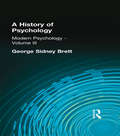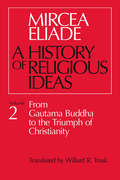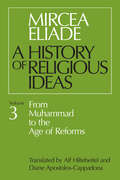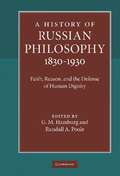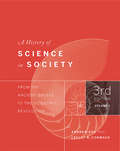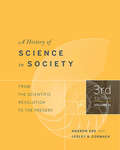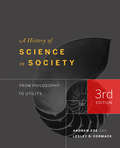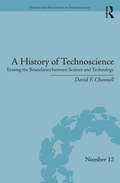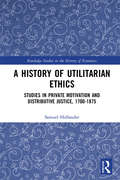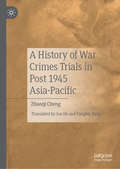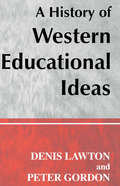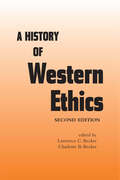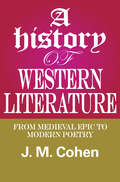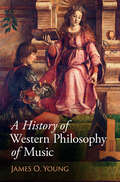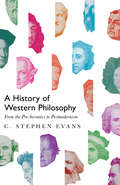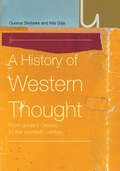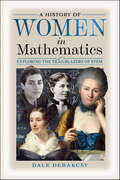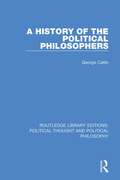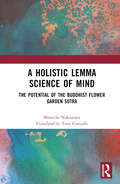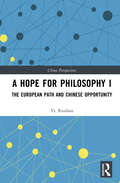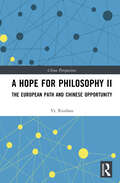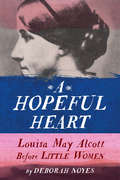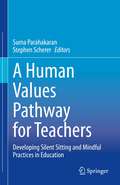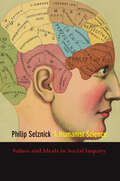- Table View
- List View
A History of Psychology: Modern Psychology Volume III
by George Sidney BrettFirst published in 2002. Routledge is an imprint of Taylor & Francis, an informa company.
A History of Pythagoreanism
by Carl A. HuffmanThis is a comprehensive, authoritative and innovative account of Pythagoras and Pythagoreanism, one of the most enigmatic and influential philosophies in the West. In twenty-one chapters covering a timespan from the sixth century BC to the seventeenth century AD, leading scholars construct a number of different images of Pythagoras and his community, assessing current scholarship and offering new answers to central problems. Chapters are devoted to the early Pythagoreans, and the full breadth of Pythagorean thought is explored including politics, religion, music theory, science, mathematics and magic. Separate chapters consider Pythagoreanism in Plato, Aristotle, the Peripatetics and the later Academic tradition, while others describe Pythagoreanism in the historical tradition, in Rome and in the pseudo-Pythagorean writings. The three great lives of Pythagoras by Diogenes Laertius, Porphyry and Iamblichus are also discussed in detail, as is the significance of Pythagoras for the Middle Ages and Renaissance.
A History of Religious Ideas, Volume 2: From Gautama Buddha to the Triumph of Christianity
by Mircea EliadeThe second volume of the extraordinary history that &“should be an essential resource for generations to come&” (Parabola). In volume two of this monumental work, Mircea Eliade continues his magisterial progress through the history of religious ideas. The religions of ancient China, Brahmanism and Hinduism, Buddha and his contemporaries, Roman religion, Celtic and German religions, Judaism, the Hellenistic period, the Iranian syntheses, and the birth of Christianity—all are encompassed in this volume. Praise for A History of Religious Ideas &“Everyone who cares about the human adventure will find new information and new angles of vision here.&”—The New York Times &“The culmination of years of impassioned scholarship…rendered with the talent of one who is not only an academic writer but a novelist of considerable distinction.&”—Times Higher Education Supplement
A History of Religious Ideas: From Muhammad to the Age of Reforms (A History of Religious Ideas)
by Mircea EliadeThe conclusion of the three-volume history “rendered with the talent of one who is not only an academic writer but a novelist of considerable distinction” (David J. Levy, Times Higher Education Supplement).In A History of Religious Ideas. Mircea Eliade examines the movement of Jewish thought out of ancient Eurasia, the Christian transformation of the Mediterranean area and Europe, and the rise and diffusion of Islam from approximately the sixth through the seventeenth centuries. Eliade’s vast knowledge of past and present scholarship provides a synthesis that is unparalleled. In addition to reviewing recent interpretations of the individual traditions, he explores the interactions of the three religions and shows their continuing mutual influence to be subtle but unmistakable.As in his previous work, Eliade pays particular attention to heresies, folk beliefs, and cults of secret wisdom, such as alchemy and sorcery, and continues the discussion, begun in earlier volumes, of pre-Christian shamanistic practices in northern Europe and the syncretistic tradition of Tibetan Buddhism. These subcultures, he maintains, are as important as the better-known orthodoxies to a full understanding of Judaism, Christianity, and Islam.Acclaim for A History of Religious Ideas“Everyone who cares about the human adventure will find new information and new angles of vision.” —Martin E. Marty, The New York Times Book Review“The volumes would be worth buying for the critical bibliographies alone, but far more than this, they represent the culmination of years of impassioned scholarship.” —David J. Levy, Times Higher Education Supplement“This multivolume work should be an essential resource for generations to come.” —John Loudon, Parabola
A History of Russian Philosophy 1830-1930
by G. M. Hamburg Randall A. PooleThe great age of Russian philosophy spans the century between 1830 and 1930 - from the famous Slavophile-Westernizer controversy of the 1830s and 1840s, through the 'Silver Age' of Russian culture at the beginning of the twentieth century, to the formation of a Russian 'philosophical emigration' in the wake of the Russian Revolution. This volume is a major new history and interpretation of Russian philosophy in this period. Eighteen chapters (plus a substantial introduction and afterword) discuss Russian philosophy's main figures, schools, and controversies, while simultaneously pursuing a common central theme: the development of a distinctive Russian tradition of philosophical humanism focused on the defence of human dignity. As this volume shows, the century-long debate over the meaning and grounds of human dignity, freedom, and the just society involved thinkers of all backgrounds and positions, transcending easy classification as 'religious' or 'secular'. The debate still resonates strongly today.
A History of Science in Society, Volume I: From The Ancient Greeks To The Scientific Revolution, Third Edition
by Lesley B. Cormack Andrew EdeA History of Science in Society is a concise overview that introduces complex ideas in a non-technical fashion. Ede and Cormack trace the history of the changing place of science in society and explore the link between the pursuit of knowledge and the desire to make that knowledge useful. Volume I covers the origins of natural philosophy in the ancient world to the Scientific Revolution. New topics in this edition include astronomy and mathematics in ancient Mayan society, science and technology in ancient India and China, and Islamic cartography. New "Connections" features provide in-depth exploration of the ways science and society interconnect. The text is accompanied by 27 colour maps and diagrams, and 4 colour plates highlighting key concepts and events. Essay questions, chapter timelines, a further readings section, and an index provide additional support for students. A companion reader edited by the authors, A History of Science in Society: A Reader, is also available.
A History of Science in Society, Volume II: From the Scientific Revolution to the Present, Third Edition
by Lesley B. Cormack Andrew EdeA History of Science in Society is a concise overview that introduces complex ideas in a non-technical fashion. Ede and Cormack trace the history of the changing place of science in society and explore the link between the pursuit of knowledge and the desire to make that knowledge useful. Volume II covers from the Scientific Revolution until the present day. New topics in this edition include science and the corporate world, the regulation of science and technology, and climate change. New "Connections" features provide in-depth exploration of the ways science and society interconnect. The text is accompanied by 38 colour maps and diagrams, and 4 colour plates highlighting key concepts and events. Essay questions, chapter timelines, a further readings section, and an index provide additional support for students. A companion reader edited by the authors, A History of Science in Society: A Reader, is also available.
A History of Science in Society: From Philosophy to Utility, Third Edition
by Lesley Cormack Andrew EdeA History of Science in Society is a concise overview that introduces complex ideas in a non-technical fashion. Ede and Cormack trace the history of the changing place of science in society and explore the link between the pursuit of knowledge and the desire to make that knowledge useful.New topics in this edition include astronomy and mathematics in ancient Mayan society, science and technology in ancient India and China, and Islamic cartography. New "Connections" features provide in-depth exploration of the ways science and society interconnect. The text is accompanied by 55 colour maps and diagrams, and 8 colour plates highlighting key concepts and events. Essay questions, chapter timelines, a further readings section, and an index provide additional support for students. A companion reader edited by the authors, A History of Science in Society: A Reader, is also available.
A History of Technoscience: Erasing the Boundaries between Science and Technology (History and Philosophy of Technoscience)
by David F. ChannellAre science and technology independent of one another? Is technology dependent upon science, and if so, how is it dependent? Is science dependent upon technology, and if so how is it dependent? Or, are science and technology becoming so interdependent that the line dividing them has become totally erased? This book charts the history of technoscience from the late nineteenth century to the end of the twentieth century and shows how the military–industrial–academic complex and big science combined to create new examples of technoscience in such areas as the nuclear arms race, the space race, the digital age, and the new worlds of nanotechnology and biotechnology.
A History of Utilitarian Ethics: Studies in Private Motivation and Distributive Justice, 1700-1875 (Routledge Studies in the History of Economics)
by Samuel HollanderIn this landmark volume, Samuel Hollander presents a fresh and compelling history of moral philosophy from Locke to John Stuart Mill, showing that a ‘moral sense’ can actually be considered compatible with utilitarianism. The book also explores the link between utilitarianism and distributive justice. Hollander engages in close textual exegesis of the works relating to individual authors, while never losing sight of the intellectual relationships between them. Tying together the greatest of the British moral philosophers, this volume reveals an unexpected unity of eighteenth and nineteenth century ethical doctrine at both the individual and social level. Essential reading for advanced students and researchers of the history of economic thought, political economy, history of ethics, history of political thought and intellectual history.
A History of War Crimes Trials in Post 1945 Asia-Pacific
by Zhaoqi ChengWritten by the Director of the Tokyo Trial Research Centre at China's Shanghai Jiao Tong University, this book provides a unique analysis of war crime trials in Asia-Pacific after World War II. It offers a comprehensive review of key events during this period, covering preparations for the Trial, examining the role of the War Crimes Commission of the United Nations as well as offering a new analysis of the trial itself. Addressing the question of conventional war crimes, crimes against humanity, crimes against peace (such as the Pearl Harbor Incident) and violations of warfare law, it follows up with a discussion of post-trial events and the fate of war criminals on trial. Additionally, it examines other Japanese war crime trials which happened in Asia, as well as considering the legacy of the Tokyo trial itself, and the foundation of a new Post-War International Order in East Asia.
A History of Western Educational Ideas (Woburn Education Series)
by Professor Peter Gordon Professor Denis LawtonIt is important that all those concerned with education - parents, teachers, administrators and policymakers - should have a reasonable understanding of the present system and how it has developed, sometimes over a period of many years. This work traces the development of Western educational ideas from the Greek society of Socrates, Plato and Aristotle, to the ideas and ideologies behind some of the controversial issues in education today.This book discusses the continuous development of educational thought over three millennia. The focus upon the history of ideas in this volume is partly an attempt to move history of education away from an approach based on 'great men' to technological, economic and political influences on ideas and beliefs. It reviews many issues, ranging from the purposes of education from the earliest times, to the challenge of postmodernism in the present century. The authors provide an accessible and thought-provoking guide to the educational ideas that underlie practice.
A History of Western Ethics
by Lawrence C. Becker Charlotte B. BeckerThis newly revised and updated edition of A History of Western Ethics is a coherent and accessible overview of the most important figures and influential ideas of the history of ethics in the Western philosophical tradition.
A History of Western Literature: From Medieval Epic to Modern Poetry
by G. MitchellThis book begins in a narrow territory, strictly Western, and extends with the passage of time to include the poetry, plays, novels, and works of speculation of the great authors of the past and present, from Russia to Mexico. His objective is to tell the whole story of Western writing in languages other than English from the twelfth-century Chanson de Roland to Evtushenko's poetry of the 1960's.Cohen not only presents a factual account of historical growth. The book reflects the author's own judgments and valuations, arrived at in the course of almost forty years' reading in the main European languages. A work of original criticism, "A History of Western Literature" immediately became a standard reference when first published. In this new edition, the author has included revisions covering the most important recent writers and their work.
A History of Western Philosophy of Music
by James O. YoungThis book presents a comprehensive, accessible survey of Western philosophy of music from Pythagoras to the present. Its narrative traces themes and schools through history, in a sequence of five chapters that survey the ancient, medieval, early modern, modern and contemporary periods. Its wide-ranging coverage includes medieval Islamic thinkers, Continental and analytic thinkers, and neglected female thinkers such as Vernon Lee (Violet Paget). All aspects of the philosophy of music are discussed, including music and the cosmos, music's value, music's relation to the other arts, the problem of opera, the origins of musical genius, music's emotional impact, the moral effects of music, the ontology of musical works, and the relevance of music's historical context. The volume will be valuable for students and scholars in philosophy and musicology, and all who are interested in the ways in which philosophers throughout history have thought about music.
A History of Western Philosophy: From the Pre-Socratics to Postmodernism
by C. Stephen EvansPlato. Aristotle. Augustine. Hume. Kant. Hegel.
A History of Western Thought: From Ancient Greece to the Twentieth Century
by Nils Gilje Gunnar SkirbekkThis is a comprehensive introduction to the history of Western Philosophy from the Pre-Socratics to Twentieth Century thought. In addition to all the key figures, the book covers figures whose contributions have so far been overlooked, such as Vico, Montesquieu, Durkheim and Weber. Along with in-depth discussion of the philosophical movements, Skirbekk and Gilje also discuss the natural sciences, the establishment of the Humanities, Socialism and Fascism, Psychoanalysis, and the rise of the social sciences. History of Western Thought is an ideal introduction to philosophy and the sociological and scientific structures that have shaped modern day philosophy.
A History of Women in Mathematics: Exploring the Trailblazers of STEM
by Dale DeBakcsyFrom ancient Greece to medieval Baghdad, from Revolutionary France to China's Qing Dynasty, women mathematicians have worked alongside men to a degree that was denied them in most other fields of scientific inquiry. Locked out of biological studies first by restrictions on their freedom of travel and later because of concerns that they would be corrupted by evolutionary thought, effectively barred from experimental physics for centuries through lack of access to specialized equipment, and inconsistently permitted a medical education, women have, for three thousand years and more, been a steady presence during every great mathematical era. They have contributed to the fundamentals of geometry and the expansion of algebra from the earliest days of those disciplines, and stepped in, on multiple occasions, to save the mathematical traditions of their home countries from death by ossification. They have guided us through the twisted realms of non-Euclidean space, gifted us the mathematical models we need to understand the behavior of the metals of our buildings and the soils we construct them upon, and given us an at times chilling view into the fates of super-massive systems over deep time. A History of Women in Mathematics, the first comprehensive account of women's role in mathematics in 35 years, tells the stories of over a hundred women, some of whom had to go to the lengths of lying about their gender in correspondence, or secrete themselves behind screens during lectures to access the mathematical resources that their male counterparts took for granted, but many of whom had positions of academic honor and international prestige that women in other fields would have to wait centuries to attain. From Theano of Croton to Rachel Riley, here are the tales of the women who have illuminated and demystified the profound structures upon which our reality is built, with stones of number and mortar of imagination.
A History of the Political Philosophers (Routledge Library Editions: Political Thought and Political Philosophy #10)
by George CatlinOriginally published in 1939, this book was intended as a guide to political theory intelligible to the common reader, with quotations from the original sources sufficiently extensive to enable them to sample for themselves the ‘taste’ and ‘colour’ of these writings. This history of theory has been placed against brief descriptions, as background, of the civilization of the times, as the reader passes down the avenues of thought from age to age. It is a history of political thought set against the background of the history of civilization, but that thought is also displayed in the setting of the characteristics and biographies of the thinkers, whose minds we search and whom we seek to know familiarly, however long ago gone to dust.
A Holistic Lemma Science of Mind: The Potential of the Buddhist Flower Garden Sutra
by Shinichi NakazawaNakazawa connects Buddhist philosophy with modern sciences such as psychology, quantum theory, and mathematics, as well as linguistics and the arts to present a perspective on understanding the mind in a world built on interconnection and networks of relations. While Lemma Science is a new and modern study of humans, its provenance is deeply rooted in the Eastern thought tradition. The ancient Greeks identified two modes of human intelligence: the logos and lemma intellects. Etymologically, logos signifies to "arrange and organize what has been gathered in front of one's self." To practice logos-based thinking, one must rely on language. Thus, humans organize and understand the objects in the universe according to linguistic syntax. In contrast, lemma etymologically signifies the intellectual capacity to "grasp the whole at once." Instead of arranging objects along a time axis, as language does, the lemma intellect perceives the world in an intuitive, non-linear and non-causal manner, comprehending the whole in an instant. This book embarks on a venture to establish a new science based upon the lemma intellect. Using non-logos-based materials, rigorously following lemma-based methods, and transgressing the boundaries of academic fields, Nakazawa seeks to construct this new science as a fluid, dynamic entity. This book will be of great interest to researchers across the fields of Japanese studies, Buddhist studies, psychology and linguistics.
A Hope for Philosophy I: The European Path and Chinese Opportunity (China Perspectives)
by Ye XiushanAs the final work by Ye Xiushan, one of the most famous philosophers and philosophy scholars in China, this two-volume title scrutinizes the historical development of both Chinese and Western philosophies, aiming to explore the convergence between the two philosophical traditions.Combining the historical examination and argumentation based on philosophical problematics, the two-volume set expounds the key figures and schools and critical thoughts in both Western and Chinese philosophical histories. In this first volume, the author investigates the intellectual heritage of ancient Greece and Thales of Miletus as the cradle of European philosophy, freedom in Greek philosophy, reason and negation in classical German philosophy, and the relationship between epistemology and ontology in the philosophical history, thereby illuminating the core spirit of Western philosophy and theoretical quandary facing the contemporary European philosophy.This title will appeal to scholars, students, and general readers interested in philosophical history, comparative philosophy, Chinese philosophy, and Western philosophy ranging over Greek philosophy, German classic philosophy, and contemporary continental philosophy.
A Hope for Philosophy II: The European Path and Chinese Opportunity (China Perspectives)
by Ye XiushanAs the final work by Ye Xiushan, one of the most famous philosophers and philosophy scholars in China, this two-volume title scrutinizes the historical development of both Chinese and Western philosophies, aiming to explore the convergence between the two philosophical traditions.Combining the historical examination and argumentation based on philosophical problematics, the two-volume set expounds the key figures and schools and critical thoughts in both Western and Chinese philosophical histories. The second volume retraces the origin and development of Chinese philosophy and reveals its focal grounds, i.e. a trinity of man, Heaven, and earth, which helps explain why and how it diverges from Western way of philosophizing. This book also delineates the diachronic transitions of Chinese philosophy that critically embrace different schools of thought throughout history, including Confucianism, Daoism, Buddhism, and Marxism, etc., and then constitutes an organic whole. To elicit the potential for a new transformation of contemporary Chinese philosophy, the author encourages a constructive dialogue between the Chinese and Western philosophies.This title will appeal to scholars, students, and general readers interested in philosophical history, comparative philosophy, Chinese philosophy, and Western philosophy ranging over Greek philosophy, German classic philosophy, and contemporary continental philosophy.
A Hopeful Heart: Louisa May Alcott Before Little Women
by Deborah NoyesHow did Little Women-- the beloved literary classic and inspiration for Greta Gerwig's acclaimed feature film adaptation--come to be? This stunning biography explores the unique family and unusual circumstances of literary icon Louisa May Alcott. Meg, Jo, Beth, and Amy. How did these cherished characters come to be? Louisa May Alcott, the author of one of the most famous "girl" books of all time, was anything but a well-mannered young lady. A tomboy as well as a ravenous reader, Louisa took comfort in fictional characters that were as passionate and willful as she was--and whose wild imaginations were a match for her own. She was often found roaming the woods near her home in Concord, Massachusetts, or exploring the natural world in the company of the great Transcendentalist thinkers Ralph Waldo Emerson and Henry David Thoreau. Here is a beautiful portrait of Louisa May Alcott, a woman influenced by her father, a penniless philosopher, her mother, with whom she shared a great connection, and, of course, her three sisters. Featuring unique indigo illustrations, Deborah Noyes unveils how Louisa's natural spirit, loving family, and unconventional circumstances inspired the timeless masterpiece that is Little Women.
A Human Values Pathway for Teachers: Developing Silent Sitting and Mindful Practices in Education
by Suma Parahakaran Stephen SchererThis book combines perspectives from psychology, spiritual education and digital teaching pedagogies in a transnational framework to discuss the Education in Human Values Program (EHV) for child development, with a focus on silent sitting, mindfulness, meditation and story-telling as tools in the classroom. Through positive guidance in the early stages of child development using EHV tools, teachers will be better equipped to handle disciplinary issues in primary and secondary schools. These practices are also useful for the higher education community, as teachers and educators from tertiary institutions may adopt these practices in their teaching and become reflective practitioners. Topics such as teacher morale and school climate and its impact on children are discussed in relation to building resilience, reflective capacities, and inner strength (shared values) using an intrinsic and transformational approach. The discussions also include perspectives from the neurosciences. With contributions from teachers and educators from the US, South Africa, Malaysia, Australia, Hong Kong and Mauritius, this edited volume addresses the challenges, strengths and weaknesses associated with daily teaching practices in primary and secondary schools and higher education institutions. The content is relevant to policymakers and researchers in child development studies, with a particular focus on the impact of silent sitting, mindful practices, and meditation on children’s self-regulation and resilience. The authors collectively espouse that silent sitting techniques can help a child to grow and discover their hidden potential, thus enhancing their social, emotional, spiritual and physical capacities.
A Humanist Science: Values and Ideals in Social Inquiry
by Philip SelznickProviding a capstone to Philip Selznick's influential body of scholarly work, A Humanist Science insightfully brings to light the value-centered nature of the social sciences. The work clearly challenges the supposed separation of fact and value, and argues that human values belong to the world of fact and are the source of the ideals that govern social and political institutions. By demonstrating the close connection between the social sciences and the humanities, Selznick reveals how the methods of the social sciences highlight and enrich the study of such values as well-being, prosperity, rationality, and self-government. The book moves from the animating principles that make up the humanist tradition to the values that are central to the social sciences, analyzing the core teachings of these disciplines with respect to the moral issues at stake. Throughout the work, Selznick calls attention to the conditions that affect the emergence, realization, and decline of human values, offering a valuable resource for scholars and students of law, sociology, political science, and philosophy.
